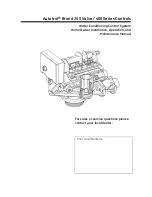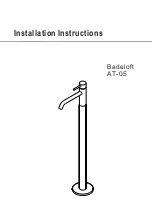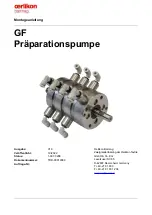
5
The room in which the appliance will be operated, must be frost-free. The appliance has to be mounted at a
convenient place, it means that the appliance must be easily available for potential necessary maintenance, repair or
replacement, as the case may be. If water is strongly calcareous we recommend that any of the common decalcifying
devices was installed with the appliance, or the thermostat to be set to minimum operation temperature of 60
o
C
(setting to position “
60
“). For proper operation, drinkable water of adequate quality shall be used.
To avoid potential sediments we recommend that the device was installed together with a water filter.
5.
Wall mounting
Prior to the mounting check the bearing capacity of the wall and the material it is made of, considering the weight of
the heater filled with water. Depending on the wall material choose adequate fixtures.
Should you have any doubts regarding the wall bearing capacity, consult the suspension with a building specialist.
The minimum diameter of the bolts for suspending the heater is 12 mm.
When mounting the anchor bolts follow the
guide provided by the anchor bolts' manufacturer.
Mount the anchors by the dimensional drawing in 350 mm spacing, and screw firmly a steel hinge onto the wall.
Check its proper vertical positioning.
Recheck the torque of the suspension bolts on the heater and suspend the heater.
If needed, the suspension bolts can be shifted by 50 mm in vertical direction.
Using the detent support in the bottom part of the heater make sure it runs in parallel with the wall!
If the hot water heater is mounted in a
tight, small space
, or in an intermediate ceiling, etc., you have to make sure
that the connecting side of the appliance (connections to water supply, area for electric plugging) remained accessible
and no heat accumulation occurs. Free space of up to 500 mm from the bottom edge of the heater has to be available
under the heater. When mounted directly under the ceiling, the distance from the ceiling has to be 50 mm at least.
5.1
Connection to power water
Power water connects to pipes with ¾“ thread in the bottom part of the heater.
Blue - cold water supply, red – hot water outlet. For potential disconnection of the heater, the service water inlets and
outlets must be provided with screw coupling Js 3/4“. Safety valve is mounted on the cold water inlet identified with a
blue ring.
Each hot service water pressure heater must have a membrane spring loaded with a safety valve. Nominal clearance of
safety valves is defined in the ČSN 0 60830 standard. The heaters are not equipped with a safety valve. The safety
valve must be easily accessible, as close to the heater as possible. The input pipes must have at least the same
clearance as the safety valve. The safety valve is placed high enough to secure dripping water drain by gravity. We
recommend mounting the safety valve onto a branch pipe. This allows easier exchange without having to drain the
water from the heater. Safety valves with fixed pressure settings from the manufacturer are used for the assembly.
Starting pressure of a safety valve must be identical to the maximum allowed heater pressure, and at least 20% higher
than the maximum pressure in the water main. If the water main pressure exceeds such value, a reduction valve must
be added to the system.
No stop valves can be put between the heater and the safety valve. During the assembly,
follow the guide provided by the safety equipment manufacturer. It is necessary to check the safety valve each time
before putting it into operation. It is checked by manually moving of the membrane from the seat, turning the make-
and-break device button always to the right. After being turned, the button must click back into a notch. Proper
function of the make-and-break device results in water draining through the safety valve outlet pipe. In common
operation, such a check needs to be implemented at least once a month, and after each heater shutdown for more than
5 days. Water may be dripping off the drain pipe of the safety valve; the pipe must be open into the air, pointed down;
environment temperatures must not drop below zero.
When draining the heater, use a recommended
drain valve. First, close water input into the heater.
Find necessary pressure values in the following
table.
For proper safety valve operation, a backflow valve
must be mounted on the inlet pipes, preventing
spontaneous heater draining and hot water penetrating back into the water main.
Safety valve
starting pressure
(MPa)
Admissible operating
water heater
pressure (MPa)
Max. pressure in
the cold water pipe
(MPa)
0.6
0.6
do 0.48
0.7
0.7
do 0.56
1
1
do 0.8



























